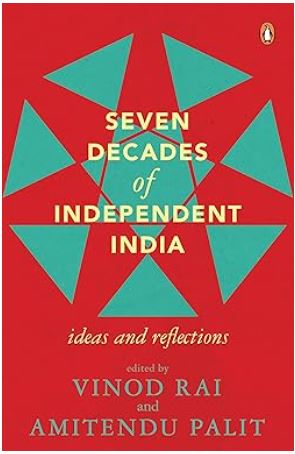The Reading Room

Seven Decades of Independent India: Ideas and Reflections
Vinod Rai
Published: 2022, Penguin Books India
Another General Election for the 1.3 billion people of India is about to conclude and at the time of writing, a third term for Modi and his BJP party is a racing certainty. Consequently for our Book Review this month I thought it would be a good time to reflect on India’s politics and its time since independence.
“Seven Decades of Independent India: Ideas and Reflections” is a compilation of essays edited by Vinod Rai and Amitendu Palit. These essays cover various subjects related to India’s achievements and challenges post-Independence and consists of 25 standalone chapters, each focusing on a specific topic. These topics range from “Security Challenges” and “India in a Globalised World” to “Skill Development.” Unfortunately, the chapters are not integrated or grouped together in a meaningful way but are more like reflections rather than a comprehensive assessment of India’s past record. Nonetheless they are interesting and worthy read.
The introductory chapter emphasises good governance and the need for an efficient civil administration. This is at the heart of Modi’s successful time in office and is the backbone to his mandate as India’s Prime Minister. While there are observations on issues like “waste management” and “pollution control,” the focus on bank management outweighs attention to other vital institutions like the judiciary or legislature. The book praises the Goods and Services Tax (GST) but lacks a critical evaluation of India’s overall achievements and failures.
Three essays discuss external affairs: One emphasises India’s engagement with neighbours in southern and Southeast Asia, advocating for a new approach to managing big power relations. Another focuses on India’s relations with the Association of Southeast Asia Nations (ASEAN), highlighting the need to translate policies into concrete actions and investments.
The chapter on “Sustainable, Productive Agriculture” by Ashok Gulati and Gayatri Mohan stands out. It offers original conclusions based on serious research. The authors argue that Punjab is not the most suitable state for rice cultivation, and Maharashtra is not ideal for sugarcane. Water availability and flows do not guarantee long-term sustainability. Crop diversification is necessary but challenging to implement.
The book provides diverse perspectives, but it lacks a cohesive narrative. It’s a worthwhile read for those curious about India’s multifaceted viewpoints, but it doesn’t offer a critical assessment. In summary, “Seven Decades of Independent India: Ideas and Reflections” offers insights into India’s journey post-Independence, but readers should approach it as a collection of reflections rather than a comprehensive analysis. If you’re interested in exploring different viewpoints on India’s progress, this book might be worth your time!
Robin Sellers
May 2024
The information contained above and in other entries in the Ocean Dial Book Review Series is intended for general information and entertainment purposes only, and should not be relied upon in making, or refraining from making, any investment decisions. No information provided herein should or can be taken to constitute any form of advice or recommendation as to the merits of any investment decision. You should take independent advice from a suitably qualified investment adviser before making any investment decisions.
Chip War – The Fight for the World’s Most Critical Technology
Published: 2022, Simon & Schuster
Power in the modern world – military, economic, geopolitical – is built on a foundation of computer chips. America has maintained its lead as a superpower because it has dominated advances in computer chips and all the technology that chips have enabled. Now that edge is in danger of slipping, undermined by the naïve assumption that globalising the chip industry and letting players in Taiwan, Korea and Europe take over manufacturing serves America’s interests.
Poor Charlie’s Almanack: The Essential Wit and Wisdom of Charles T. Munger
Published: 2023, Stripe Press
From 1733 to 1758, Benjamin Franklin, the Founding Father of the United States of America, dispensed useful and timeless advice through his book Poor Richard’s Almanack (“Poor Richard” being the pseudonym adopted by Benjamin Franklin for this purpose). Among the virtues extolled were thrift, duty, hard work, and simplicity. Then some two and fifty hundred years later Charlie Munger stepped forth with Poor Charlie’s Almanack, a collection of speeches and talks by Charlie Munger first published in 2005.
The Ride of a Lifetime
Published: 2019, Transworld Publishers
Robert Iger became CEO of The Walt Disney Company in 2005, during a difficult time. Competition was more intense than ever and technology was changing faster than at any time in the company’s history.


